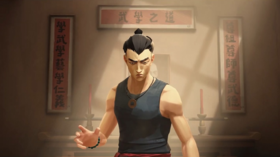It’s OK for white people to make Asian-themed video games


If it were up to woke progressives, 20th century action movie heroes like Steven Seagal, Jean-Claude Van Damme, and Chuck Norris would’ve never had careers. Complaints about “cultural appropriation” would’ve never allowed them to become international superstars – on account of martial arts being of Chinese, Korean, and Japanese origin.
Not that terminally-offended progressives would ever consult with the Chinese, Koreans, or the Japanese about what they thought of white men performing Kung Fu. The same people that have deemed it necessary to add trigger warnings and disclaimers on classic literature in universities have now deemed it offensive for a “studio full of white developers” to develop a Kung Fu-based game.
Enter ‘Sifu’, a video game inspired by ’80s martial arts movies that has now come under fire for being made by game developers of the wrong ethnicity.
Singapore-based Khee Hoon Chan, an editor for TheGamer, claims that Sloclap, the studio that developed the title, was wrong to draw inspiration from Jackie Chan movies and Chinese martial arts on account of their ethnicity.
“We all shared a love for martial arts action movies,” said Pierre Tarno, co-founder of Sloclap and the executive director of ‘Sifu’, in an interview with The Verge. “Ranging all the way from old Bruce Lee movies, to ’80s and ’90s Jackie Chan movies, Donnie Yen, and contemporary movies like ‘The Raid’. We were like, ‘Okay, let’s do a game that is a love letter to that cinema which we deeply love.’”
Tarno was joined by Ben Colussi, a French-born Bak Mei martial artist who teaches the form in France, where he met and trained several Sloclap developers long before they made the game. According to his website, Colussi has bonafides – he studied the martial art under the tutelage of Shaolin Kung Fu master Lao Wei San and had his blessing to open the martial arts school.
So far, so good – but not good enough for The Verge, or any other game journalist now taking issue with the developers for being of the wrong race.
Despite being the first to call it out, Khee isn’t the only one to take issue with the developers’ racial backgrounds. The Verge writer Ash Parrish, who is black, argues that the game “is a Chinese story told almost exclusively by white men.”
“As the video game industry (painfully, slowly) evolves beyond its old white boys’ club, it should be standard practice that a story about a culture, involving its mythologies, language, and sacred practices, intimately involves people of that culture,” wrote Parrish in her painful review of the game, which is mainly comprised of an interrogation of the development team.
Citing Khee Hoon Chan’s issues with ‘Sifu’ is an article by black video game critic Fūnk-é Joseph (yes, that’s really the name “they” go by) who slammed ‘Sifu’ for being made by white developers.
“Seeing white people rip other cultures as wallpaper for their creations, no matter how much research is done, is cringy,” wrote Joseph, dismissing the bonafides of the ‘Sifu’ developers. “I’m here for representation, but I’m also a believer that you should write what you know.”
“While playing through ‘Sifu’, it’s hard not to think about its development team being white,” Joseph insists in-between praising the title for being nothing short of “phenomenal.” Is Joseph, as a distinctly non-Chinese person, appropriating enjoyment from anyone of Chinese descent?
“The stories of people of color deserve to be told – and we deserve to be the ones telling them,” Joseph argues, to which I would respond: The best men (or women) for the job should be the ones to tell the story.
The simple fact is that the makers of ‘Sifu’ at Sloclap pulled off the difficult task of making a great game. In an ocean of mediocrity, ‘Sifu’ rises above the competition – a fact highlighted even by its wokest critics.
‘Sifu’ may not have been made by Chinese developers, who are struggling thanks to the weight of the communist government’s crackdown on video game licensing, but its developers’ love and care of Chinese culture lends volumes to its authenticity. In the absence of a Chinese-led studio, how else is anyone to get an authentic Chinese martial arts experience in a video game, if not from elsewhere?
It isn’t as if Asians in general have been unsuccessful in telling Asian stories, either. Japan has unarguably one of the longest and most colorful histories of presenting Japanese (and even Chinese, in the case of the Three Kingdoms strategy games) stories to an international audience. From the over-the-top ‘Ninja Gaiden’ to the slightly more tonally serious ‘Yakuza’, Japanese developers have never struggled with telling distinctly Japanese stories.
And in the case of ‘Ninja Gaiden’ – it’s not some faithful retelling of the ninja war against Oda Nobunaga in 1581. Instead, it’s a title inspired by American ’80s action movie schlock like ‘American Ninja’ and any number of Cynthia Rothrock films. Not exactly “authentic” by any stretch of the imagination.
The bottom line is that Asians don’t care about who makes the games, the movies, or tells the stories about Kung Fu masters brawling with bad guys in tight corridors and all manner of open spaces. The Japanese historical epic ‘Ghost of Tsushima’ was, after all, Sony’s highest-selling game on the PlayStation in Japan – and it was produced by developers in Seattle, Washington.
I am Chinese, and I think it's absurd for anyone (black, white, Asian or whatever) to dictate who can or cannot make games based on Chinese culture. They don't speak for me, and as we've seen with ‘Ghost of Tsushima’–and‘Sifu’–it doesn't take an Asian to make a good Asian video game.
The statements, views and opinions expressed in this column are solely those of the author and do not necessarily represent those of RT.